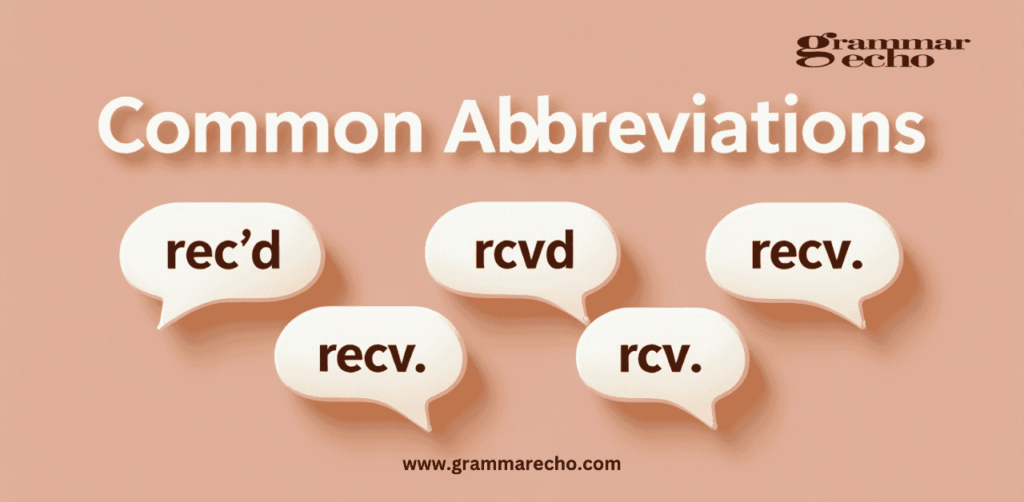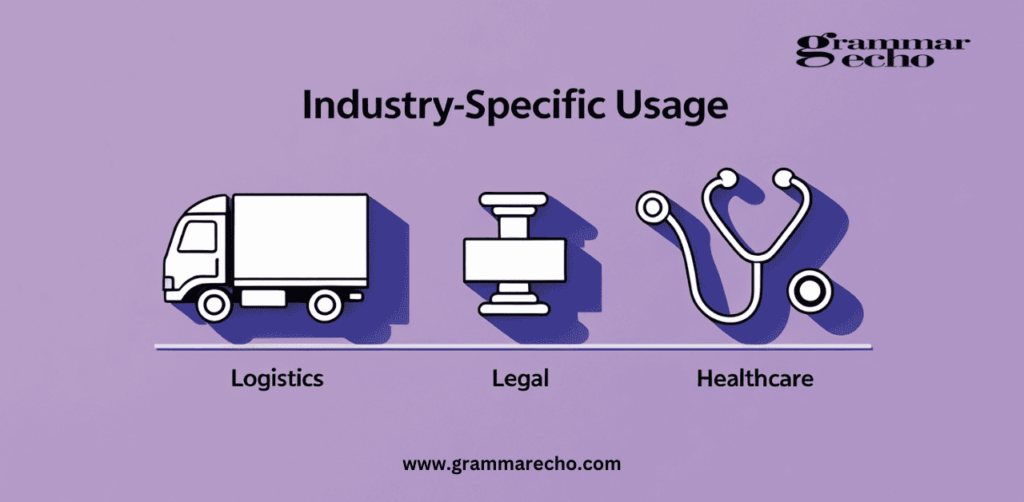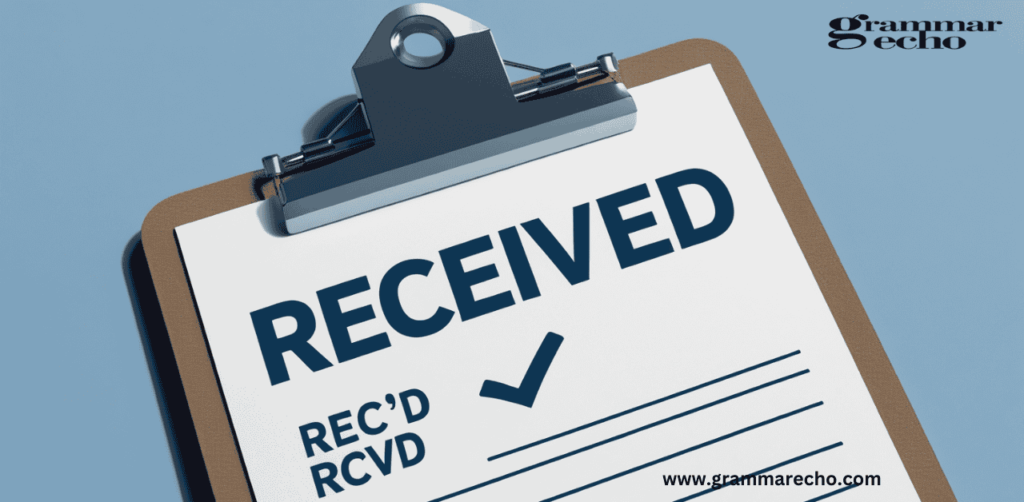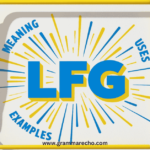The abbreviation for received is often written as Rec’d or Rcvd. These short forms mean that something has been accepted or taken. You might see them in emails, invoices, or messages to save time.
Imagine getting an email that says, “Rec’d your request.” It’s like a quick nod that your message was seen. This small shortcut keeps communication fast and clear.
“Rec’d” is more formal, while “Rcvd” is casual. Both come from the word “received,” which has roots in Latin. Using them helps avoid repeating the full word and keeps things simple.
What Does “Received” Mean?

The word received means to have taken, accepted, or obtained something. It shows that an item, message, or action has reached its destination. For example, “I received your email” means the message arrived and was acknowledged.
It’s used in many contexts, like receiving a gift, payment, or information. Businesses use it to confirm orders or payments, like “Received payment for Invoice #123.” In daily life, you might say, “She received a package today.”
Received works in both formal and casual settings, making it a versatile word for clear communication.
Key Facts
- Part of Speech: Verb.
- Synonyms: Accepted, obtained, acquired.
- Antonyms: Rejected, refused, declined.
You should read: Abbreviation for Breakfast? Definition & Meaning
The History of “Received”
The word received comes from the Latin recipere, meaning “to take back” or “to accept.” It traveled through Old French as receivre and entered Middle English by the 1400s. Back then, it appeared mostly in formal records and legal documents to confirm that something was officially taken or acknowledged.
Over centuries, its use broadened into everyday language. By the 1800s, abbreviations like Rec’d emerged in business letters to save time. Today, it’s a staple in both casual chats and professional settings, proving how language evolves to fit our needs.
Evolution in Communication
- 14th Century: Used in formal records and letters.
- 19th Century: Abbreviated forms emerged in business writing.
- Modern Era: Digital communication accelerated its shorthand use (e.g., Rec’d, Rcvd).
Why Abbreviate “Received”?
Abbreviations like Rec’d and Rcvd save time and space in fast-paced environments. They reduce redundancy in emails, invoices, and records while maintaining clarity.
People shorten “received” for several practical reasons:
Save Time
- Quick note-taking in meetings
- Faster message responses
- Less typing in busy situations
Save Space
- Character limits in texts
- Small spaces on forms
- Compact record-keeping
- Limited room in spreadsheets
Common Business Practice
- Standard in shipping documents
- Used in financial records
- Professional shorthand
- Widely recognized in industry
Digital Efficiency
- Fast data entry
- Mobile messaging
- Technical logs
- System notifications
While abbreviations are handy, use the full word “received” when clarity matters most, especially in formal documents or important communications.
Benefits
- Efficiency: Quick acknowledgment of messages or documents.
- Clarity: Avoids ambiguity in professional exchanges.
- Versatility: Works in formal and casual contexts.
Common Abbreviations for Received

The word received has several abbreviations to make communication faster and clearer. The most common ones you’ll see are Rec’d, Rcvd, Recv., and Rcv.. Each one works a little differently depending on where you use it.
Rec’d is the most formal and is often used in business emails or official documents. For example, you might see “Rec’d payment on 02/15” in an invoice. Rcvd is more casual and shows up in texts or quick notes, like “Rcvd your message!” Recv. and Rcv. are less common but still used in specific fields, such as logistics or accounting.
Here are the four primary abbreviations for received, ranked by formality:
1. Rec’d (Most Formal)
- Usage: Business emails, contracts, invoices.
- Example: “Rec’d payment for Order #789 on 03/15.”
2. Rcvd (Digital/Casual)
- Usage: Texts, social media, quick notes.
- Example: “Rcvd your invite! See you there.”
3. Recv. (Industry-Specific)
- Usage: Logistics, accounting, technical documents.
- Example: “Recv. shipment logged at 2 PM.”
4. Rcv. (Rare)
- Usage: Informal memos or shorthand notes.
Read also: Abbreviation for Payment: Definition & Meaning
When to Use “Rec’d” vs. “Rcvd”
Both “Rec’d” and “Rcvd” are shortcuts for “received,” but they’re used in different situations:
“Rec’d”
- More formal and traditional
- Common in business notes
- Used in handwritten documents
- Easier for most people to understand
- Often seen in meeting minutes
“Rcvd”
- More technical and modern
- Used in digital communication
- Common in text messages
- Popular in computer systems
- Saves more space in character-limited messages
Quick tip: When in doubt, use “Rec’d” for business and “Rcvd” for casual digital messages. Or better yet, just write out “received” if you have space – it’s always clearer!
Abbreviation Guide
| Abbreviation | Context | Example |
| Rec’d | Formal | “Rec’d invoice attached.” |
| Rcvd | Casual/Digital | “Rcvd your text this morning.” |
| Recv. | Industry-Specific | “Recv. order confirmed.” |
| Rcv. | Rare/Informal | “Rcv. note on desk.” |
How to Pronounce “Received”
Pronounce it as /rɪˈsiːvd/, with emphasis on the second syllable (“CEE”).
Common Mistakes to Avoid
- Incorrect: “Re-seeved” or “Ree-syvd.”
- Correct: “Ri-SEEvd” (clear “v” sound).
Synonyms & Antonyms for “Received”
Words that mean the same as “received” (synonyms) include “got,” “obtained,” “accepted,” and “acquired.” These words help us express the action of getting something, whether it’s a physical item, information, or even a feeling.
Synonyms
- Accepted
Example: She accepted the delivery without checking the contents. - Obtained
Example: He obtained the permit after weeks of waiting. - Acquired
Example: The company acquired new software to improve efficiency. - Gained
Example: They gained approval for the project proposal. - Secured
Example: She secured a loan to start her small business. - Collected
Example: He collected the package from the post office
Antonyms
On the flip side, words that mean the opposite (antonyms) include “sent,” “gave,” “delivered,” and “rejected.” These words describe actions that go in the other direction – giving something away or refusing to accept it.
Antonyms for Received
- Rejected
Example: The application was rejected due to missing documents. - Refused
Example: She refused the gift with a polite smile. - Declined
Example: He declined the invitation to the conference. - Denied
Example: Access to the restricted area was denied. - Returned
Example: The package was returned to sender as undeliverable. - Abandoned
Example: They abandoned the plan after funding was cu
You should read: Abbreviation for Transfer? Definition & Examples
Abbreviations in Professional Communication
Real-World Examples
- Email: “Rec’d your proposal—looking forward to discussing.”
- Invoice: “Recv’d payment for services rendered.”
- Memo: “Rcvd documents require review by Friday.”
Why It Matters
Abbreviations streamline workflows and reduce miscommunication in high-stakes environments.
Abbreviations in Digital Communication
Trends in 2024
- Texting: “Rcvd your message! 😊”
- Social Media: “Rec’d the package—thanks @CompanyXYZ!”
- Email Subjects: “Rec’d: Meeting Notes Attached.”
Industry-Specific Usage

Logistics
In logistics, abbreviations like Rcv’d streamline communication during fast-paced operations. For example, “Rcv’d shipment logged at warehouse #45” confirms receipt of goods while updating inventory systems. This ensures real-time tracking and reduces delays in supply chains. Warehouse teams use “Rcv’d” to mark deliveries as received, triggering next steps like quality checks or dispatch.
Legal
Legal professionals use Rec’d to document receipt of critical documents, such as “Rec’d contract addendum on 03/22.” This abbreviation confirms timely acknowledgment, which is vital for meeting deadlines or compliance requirements. Law firms often mark “Rec’d” on court filings, client communications, or internal memos to maintain clear records and avoid disputes over delivery timing.
Healthcare
In healthcare, Received is used to track patient records or supplies, such as “Received patient X-rays for Dr. Lee’s appointment.” This ensures medical staff have necessary documents before treatment. Nurses might note “Received lab results at 10:30 AM” to coordinate care. Abbreviations like “Recv’d” also appear in pharmacy logs to confirm medication deliveries, ensuring continuity in patient care.
FAQs
The most common abbreviations for “received” are Rec’d (formal) and Rcvd (casual). Both are widely used to confirm receipt of messages, payments, or documents.
“Recd” is an older, less common abbreviation for “received.” It is similar to “Rec’d” but is rarely used today due to its outdated style.
“NR” typically stands for “Not Received” or “No Reply”. Its meaning depends on context, such as shipping or messaging.
Yes, Rcvd is a modern abbreviation for “received.” It is commonly used in digital communication, texts, and informal settings.
Final Thoughts
Understanding when to use Rec’d or Rcvd enhances clarity and professionalism. These abbreviations are essential tools in modern communication, bridging efficiency and precision.
Abbreviations like Rec’d and Rcvd make communication faster and clearer. They help you avoid repeating the full word “received” in emails, texts, or documents.
Using these abbreviations keeps your messages short and to the point. Whether in business or casual chats, they save time and effort. Try them in your next message!

“Autumn Rose is a contributor to our blog who loves language. She writes about word meanings, spelling tips, and adjectives. Her goal is to make grammar easy and fun for everyone, helping readers improve their language skills.”








